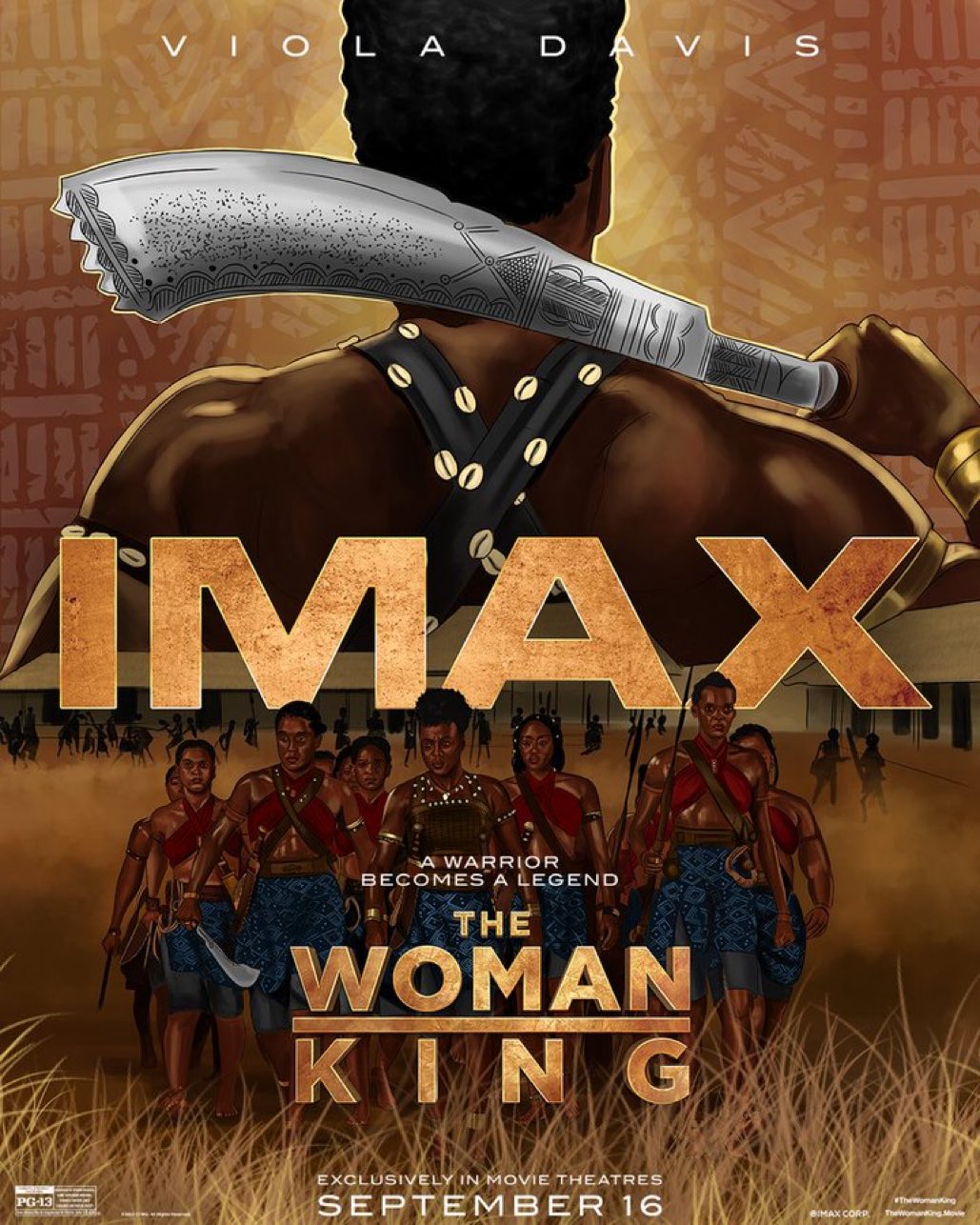
29 Sep The Woman King Review
THE WOMAN KING
dir. Gina Prince-Blythewood, starring Viola Davis, Thuso Mbedu, Lashana Lynch, Sheila Atim, and John Boyega
The Woman King, a historical epic about the West African all-female warrior camp known as the Agojie, focuses on General Nanisca, leader of the Agogie and her quest to convince King Ghezo of bowing out of the slave trade. As Nanisca trains the newest generation of warriors to continue their fight, new recruit Nawi proves a difficult study and brings with her a revelation that shakes the General to her core.
Directed by Gina Prince-Blythewood, The Woman King manages to sneak in one last awesome big budget action blockbuster for the late summer crowds. Fresh off her Netflix action film The Old Guard, Prince-Blythewood has stepped up her game tenfold with The Woman King, delivering a story deftly balanced between action and character development. While the story starts slow, once the second act settles in and Nawi’s training begins in earnest, the movie moves at a brisk clip, alternating between showing the Agojie as both fierce warriors and three dimensional characters with their own motivations and desires. Bold and vibrant, brimming with color, well lit, and easy to follow action set pieces (with just enough of a pinch of romance as well), The Woman King delivers enough of a punch to make anyone in the audience want to pick up a weapon and join the fight on screen.
To get out in front of it, how historically accurate is The Woman King? The answer is hardly. The Dahomey, the kingdom in which the story takes place was indeed incredibly active in the slave trade that our General Nanisca is actively working to abolish. While King Ghezo (played here by John Boyega) declared he’d end slave trading, his efforts continued until he was assassinated in 1858. The Woman King takes liberties with all this, as most historical fiction does. The quest to end the Atlantic trade is more a plot point here in the film, with the focus of the story being on General Nanisca and new recruit Nawi. For Nanisca, a victory over trader Oba Ade is a personal one; for Nawi, her inner turbulence at her wish to become Agojie conflicts with the arrival of the charming young Malik. These are the crux of the stories with the barest hints of reality sprinkled throughout. If you go into the movie expecting to see an adherence to actual events, prepare to leave disappointed. If you enter with the hope of seeing a great movie, you’re in for a treat.
Starring Viola Davis, The Woman King shows the veteran actress flexing her abilities and proving once again that she’s one of the best working in the industry. Davis has a knack for portraying characters with relentlessly tough exteriors, and General Nanisca is no different. As the leader of the Agojie, Nanisca is cold and efficient, with an icy no-nonsense demeanor that Davis has made a career of portraying. Counterbalancing that in the quieter moments with her confidant Amenza, Nanisca is vulnerable, almost emotionally naked as she relays her fears and nightmares. Davis is just as impactful in these scenes, giving Nanisca a depth and dimension beyond just being a talented fighter.
While Davis delivers a to-be-expected great performance, it’s Thuso Mbedu as Nawi that steals a few scenes. The young fighter, the audience’s viewpoint into the society and culture, Nawi is forced to grow up quick as she stumbles through both the Agojie training and through life in general. Stubborn, obstinate, and at times reckless, Mbedu is charming as the young fighter eager to prove herself. While her scenes with Jordan Bolger as Malik which serve as the romance subplot are weak, her pairing with Lashana Lynch’s Izogie more than make up for those shortcomings. Lynch has long since proved herself an adept screen partner and here is no different, passing for the best excuse of comedic relief. Lynch lights up the screen with her expressive face and playful banter. Guiding Nawi through the training, Izogie couples incredibly well with both her and General Nanisca, providing the film with some much-needed levity at times.
Director Gina Prince-Blythewood delivers a surprising late-round sleeper hit with The Woman King, a movie that feels lush and cinematic and deserves to be seen on the biggest screen possible. It seems that Prince-Blythewood’s entire career has been building to this moment: The Woman King has the attention to character of Love & Basketball (2000) while giving the audience the same well-crafted set pieces of The Old Guard (2020). Cinematographer Polly Morgan manages to bring a pop and zest to the movie, providing a dynamic camera through the action scenes, putting the viewer directly in the middle of the brutality. Aided by Terence Blanchard’s score, fully of melodic motifs that bring a softness and humanity to the warriors, The Woman King closes out the summer blockbuster season with a flourish.
Overall, when judged on its own merits as a film and not as a retelling of historical events, The Woman King works on almost every level. Gina Prince-Blythewood’s direction is solid, the acting is powerful, the score rousing, and its 135 minute runtime is sure to keep audiences engaged. While the story completely falls apart after a minute of scrutinizing the real-world events that inspired it, hopefully the film serves as a catalyst for people to research the history behind the Dahomey and its band of female fighters. If a tribe of African warrior women kicking any and all manner of ass for two hours appeals to you, this movie will be right up your alley. The Woman King is currently in theaters.
Review by Darryl Mansel


Brayhia Marshall
Posted at 10:53h, 01 OctoberWell said Mansel! I believe the point of the film overall was to pay homage to the Agojie and inform the world of their existence. The Dahomey (King Ghezo) did have a period where they stopped trading slaves but picked it back up. I loved the review! Keep them coming!!